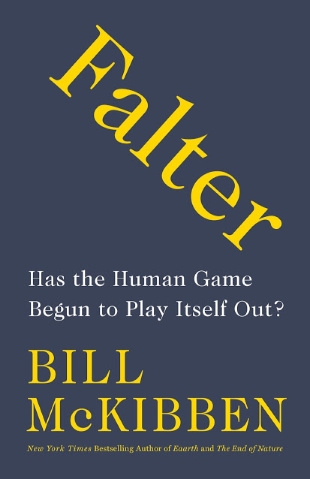"Right now, just focus on what we've already done, how much we've already changed our world. Consider California, the Golden State, long the idyllic picture of the human future. It endured a horrific five-year drought at the start of this decade, the deepest in thousands of years — so deep that the state was tapping into groundwater that was twenty thousand years old, rain that fell during the last Ice Age; so deep that the state's Sierra Nevada range rose an inch just because sixty-three trillion gallons of water had evaporated; so deep that it killed 102 million trees, a blight 'unprecedented in our modern history,' in the words of the Los Angeles Times. (Sugar pines should live five hundred years, but 'everywhere you walk, through certain parts of the forest, half these big guys are dead,' said one forester.) The drought ended in the winter of 2017, when the rains finally came, an endless atmospheric river that poured off the hot Pacific into the high mountains. Everyone breathed a sigh. California's authorities said, of course, that they understood the reprieve was only temporary but they could be forgiven for relaxing a little as the hills turned lush and green. (Anyway, they were having enough trouble with the floods that the record rainfall produced: the deluge caused almost a billion dollars in damage, for instance, to the nation's highest dam.)
"The summer of 2017, though, proved hotter and drier than even in the worst years of the drought, and all that green grass soon browned up, and in October, a firestorm swept through Napa and Sonoma. Despite all the TV alerts and text warnings, it killed more people in a shorter time than any American fire in a century — old people, especially, who simply couldn't outrun the flames. Reporters described the 'apocalyptic scene' in neighborhoods that, twenty-four hours earlier, came as close to representing the good life as any place on earth. People died in swimming pools where they'd taken shelter, the tiled sides as 'hot as oven racks.' In Santa Rosa, 'the aluminum wheels on cars melted and dripped down driveways like tiny rivers of mercury before hardening. A pile of bottles melded together into a tangle so contorted it looked like a Picasso sculpture. Plastic garbage bins were reduced to mere stains on the pavement.' . . .
"The rest of 2018 was no better. By early August, the record for the largest fire in state history had fallen again, to a massive blaze in the Mendocino area. Yosemite Valley was closed 'indefinitely' as flames licked at its access roads; and meteorologists were trying to make sense of a vast 'fire tormado' that rose 39,000 feet above the city of Redding and twisted so violently it stripped the bark from trees. And then, in autumn, came the most gruesome fire of all, in the Sierra foothills above Chico. After the fall 'rainy season' delivered a seventh of an inch of precipitation, the town of Paradise exploded in flames; people died by the score in their cars as they tried to flee down narrow, burning roads. The president blamed the conflagration on 'forest mismanagement' and recommended 'raking'; meanwhile forensic teams tried to recover the victims' DNA from the ashes of burned-out subdivisions.
"This is our reality right now. It will get worse, but it's already very, very bad. Nora Gallaher again: 'Climate believers, climate deniers, deep in our hearts we think it will happen somewhere else. In some other place — we don't actually say this but we may think it — in a poorer one, say, Puerto Rico or New Orleans or Cape Town or one of those islands where the sea level is rising. Or it will happen in some other time, in 2025 or 2040 or next year. But we are here to tell you, in this postcard from the former paradise, that it won't happen next year, or somewhere else. It will happen right where you live and it could happen today. No one will be spared.' " ("Southern Californians Know: Climate Change Is Real, It Is Deadly, and It Is Here," Guardian, March 3, 2018)
